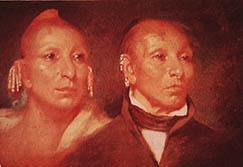Our neighbors of
the Intelligencer have remarked, that BLACK HAWK and his associates, in
their speech to the President, stated their expectations of being discharged
on their arrival at this place. The object of this remark is obvious,
and it has been improved upon by one of the Opposition papers, which charges
that these Indians were in fact entrapped and brought here under the guise
of visitors, and then detained. We have nothing to do with the charity
of this insinuation---but a few words will suffice---for its truth, or
rather for its want of truth.
The Sacs and Foxes, as we have before had cause to observe, have long
been uneasy and troublesome. After the first cession of their country
on this side of the Mississippi, made we believe with Gen. Harrison at
St. Louis, in 1804, they still asserted a right to it, and gave the government
much trouble. During the war, they were active enemies; but after the
peace, we think in 1816, an arrangement for their conciliation was made
by Governor Edwards and General Clark. This was as unavailing as preceding
efforts; and from time to time, for some years, they kept the frontier
in a state of alarm. At length, in 1831, they took forcible possession
of a part of the ceded country, and drove away the inhabitants. A considerable
force was assembled under General Gaines, and eventually, he and Governor
Reynolds entered into an arrangement with them, by which they again relinquished
all pretension to the land, and agreed not to cross the Mississippi without
permission. In 1832, this agreement was wholly violated, and hostilities
were the consequence. General Scott would not consent to lay down his
arms till the principal agitators of these disturbances were surrendered
to him. This was done, and, in the treaty which followed, an article
was
inserted---quoted by us the other day, which provided that Black Hawk
and others should be held as hostages, during the pleasure of the President.
An appropriation was made at the last session of Congress to carry this
stipulation into effect---and, with the humane object of giving them
more
freedom than was compatible with their vicinity to the frontier at St.
Louis, provision was made for their removal to a more secure place. We
understand they have been sent to Point Comfort, with directions that
they should be allowed to go about, to enjoy all proper freedom. They
have a respectable interpreter with them, and are well provided with
clothes.
To insinuate that they were deceived and brought here under any false
pretence, is utterly untrue. Such deception would have been entirely useless,
as well as indefensible. They were in prison, and we believe in irons,
held by the consent of their people, under a treaty stipulation, not only
as hostages, but to secure the frontier against the renewal of their machinations.
There was no possible motive to deceive them. Their consent to come was
never asked. It is very possible, that with the sanguine temperament,
which belongs to their race, they may have hoped to be liberated here.
But we may safely say that no person had authority to excite such an expectation,
nor do we believe even an intimation of the kind was given to them. We
have made some enquiry, and learn that they will be detained no longer
than may seem necessary for the defence of the frontier.---There are already
rumors of further Indian difficulties, and the people seem alarmed, and
although we do not believe that hostilities are mediated by the Indians,
still, this state of things requires caution and attention; and it would
surely be a most improper time to discharge these persons, when such reports
are afloat, and credited in respectable quarters.
|


